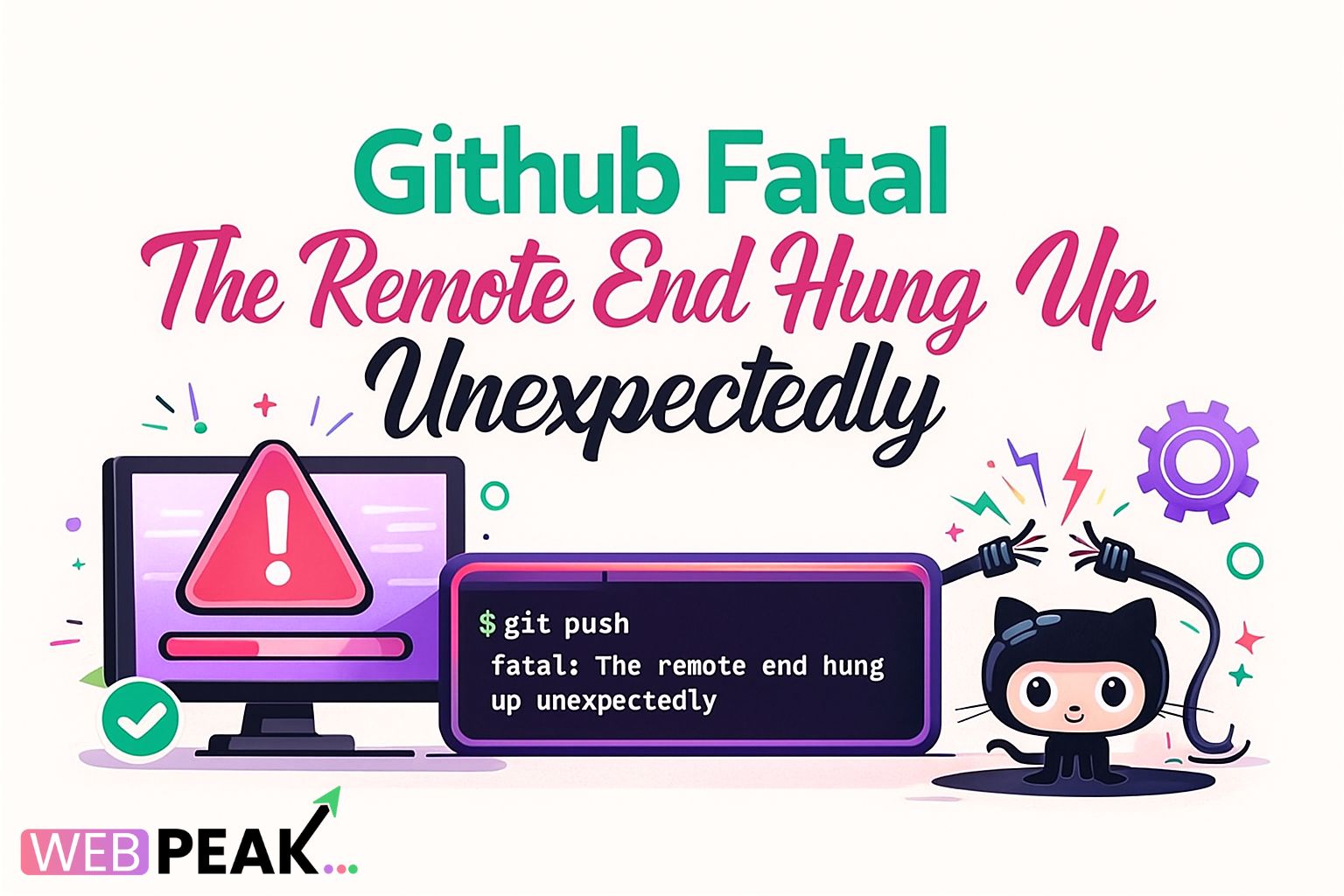Github Fatal The Remote End Hung Up Unexpectedly: Causes, Fixes, and Best Practices
Github Fatal The Remote End Hung Up Unexpectedly is one of the most frustrating errors developers face when pushing code to a repository. It abruptly stops your Git operations, often without a clear explanation, leaving your work hanging mid-upload. This issue usually appears during large commits, network interruptions, authentication problems, or repository configuration conflicts. Understanding the root causes and reliable solutions is crucial for maintaining smooth development workflows, especially when your business or project relies heavily on fast and efficient version control.
In this in-depth guide, we will explore the primary reasons this error occurs, explain how to fix it using actionable methods, provide an easy troubleshooting checklist, and highlight proactive practices to avoid the issue long-term. Whether you're a solo developer or part of a larger technical team, this article aims to help you resolve the error effectively and prevent future disruptions.
For businesses that need expert web development, digital marketing, or SEO solutions, partnering with a full-service agency like WEBPEAK can ensure your digital infrastructure—including Git-based workflows—remains optimized and reliable.
Understanding the “Github Fatal The Remote End Hung Up Unexpectedly” Error
This error generally indicates an unexpected interruption in the communication between your local machine and GitHub’s servers. Git attempts to push or fetch data, but something breaks the connection before the operation completes. Because Git works in packets and streams, an incomplete transfer instantly triggers a fatal error.
Typical Symptoms
- Push or fetch operations fail mid-process
- Large uploads crash unexpectedly
- Timeout or connection reset during Git actions
- Partial file transfers before failure
Common Variations of the Error Message
error: RPC failed; curl 18 transfer closed with outstanding read data remaining fatal: The remote end hung up unexpectedly fatal: protocol error: bad pack header fatal: early EOF
Main Causes of the Error
Multiple underlying factors can trigger this issue. Below are the most common causes developers encounter.
1. Large File Sizes or Repository Size Limitations
GitHub has specific limits on file and repository sizes. While GitHub allows repos up to several gigabytes, individual pushes near or above 100MB often fail without Git LFS.
2. Slow or Unstable Internet Connection
A weak connection can interrupt data transmission, causing GitHub to close the connection prematurely.
3. Git Buffer and HTTP Post Size Restrictions
Git has built-in buffer limits. If your commit exceeds these limits, Git fails to upload the pack file.
4. SSH or HTTPS Authentication Issues
Expired keys, misconfigured SSH, or broken tokens can cause GitHub to terminate the connection.
5. Server-Side Timeout
Slow transfers can exceed GitHub’s timeout window, causing it to abandon the connection.
6. Corrupted Repository or Broken History
Malformed objects or history conflicts can break Git operations.
How to Fix “Github Fatal The Remote End Hung Up Unexpectedly”
Below are the most reliable and developer-tested solutions.
1. Increase Git Buffer Size
If your commit is large, increasing the buffer size often resolves the issue.
git config http.postBuffer 524288000 git config http.maxRequestBuffer 1000M git config http.lowSpeedLimit 0 git config http.lowSpeedTime 999999
This tells Git to allow much larger uploads and prevents premature timeout.
2. Use Git Large File Storage (Git LFS)
If you are pushing large media files (videos, images, binaries), Git LFS is the ideal solution.
git lfs install git lfs track "*.zip" git add .gitattributes git add . git commit -m "Add LFS tracking" git push
Git LFS stores large files outside your repo while referencing them efficiently.
3. Fix Connection Issues
If you're on slow Wi-Fi or have bandwidth fluctuations, try the following:
- Switch to a wired connection
- Restart your router
- Close bandwidth-heavy apps (cloud sync, streaming, torrents)
- Use a faster network such as a mobile hotspot
Even small improvements in connection stability can prevent packet loss.
4. Switch to SSH Instead of HTTPS
SSH is more stable and secure than HTTPS for large transfers.
git remote set-url origin git@github.com:username/repo.git
Make sure your SSH key is added to your GitHub account before switching.
5. Split Large Commits into Smaller Ones
Huge commits overload Git. Break changes into smaller logical commits:
git add file1 git commit -m "Add file1" git add file2 git commit -m "Add file2"
Keep each commit under 20MB when possible.
6. Shallow Clone for Fetch Issues
If the error occurs on git pull or git clone, try using a shallow version:
git clone --depth 1 https://github.com/user/repo.git
This downloads only the latest snapshot without the full history.
7. Clean and Optimize the Repository
git gc --prune=now git repack -a -d --depth=250 --window=250
These commands compress and restructure repo objects to prevent corruption.
8. Re-authenticate Your GitHub Credentials
If your session or token expired, refresh it:
- For HTTPS: Clear saved credentials
- For SSH: Regenerate a key pair
- For PAT: Create a fresh GitHub personal access token
Advanced Fixes for Persistent Issues
1. Rebuild the Repository’s Pack Files
git fsck --full git gc --aggressive --prune=now
This identifies broken objects and attempts to repair the repository.
2. Push Using Verbose Mode
To identify the source of the issue:
GIT_TRACE_PACKET=1 GIT_TRACE=1 GIT_CURL_VERBOSE=1 git push
This produces detailed logs for debugging.
3. Change Remote URL to SSH with Dedicated Port 443
Useful in restricted networks:
ssh -T -p 443 git@ssh.github.com git remote set-url origin ssh://git@ssh.github.com:443/username/repo.git
SEO Checklist for Developers Troubleshooting Git Errors
Below is an actionable SEO checklist you can follow when writing or referencing Git-related documentation:
Technical SEO Actions
- Use keyword-rich headings (H1, H2, H3)
- Optimize images with compressed sizes and alt tags
- Ensure mobile-friendly readability
- Use internal linking for related tutorials
- Maintain fast page load time
Content SEO Actions
- Include primary keywords naturally within first 100–150 words
- Create comprehensive long-form content.
- Use related keywords (Git errors, GitHub troubleshooting, remote end hung up fix)
- Write actionable steps developers can use immediately
- Use schema markup for FAQ and How-To sections
User Experience Optimization
- Keep paragraphs short and readable
- Use bullet points for scanning
- Offer code snippets for clarity
- Add troubleshooting checklists
- Provide a clear path to solving the problem
Frequently Asked Questions (FAQ)
1. What causes the “remote end hung up unexpectedly” error on GitHub?
The error is mainly caused by large files, slow internet connections, buffer limits, authentication issues, or corrupted Git objects.
2. How do I fix this GitHub error quickly?
The most common fix is increasing Git’s buffer size and ensuring your internet connection is stable.
3. Can large files trigger this error?
Yes. Git struggles with files over 100MB unless you use Git LFS.
4. Should I use SSH instead of HTTPS for GitHub?
SSH is generally more reliable for large pushes and avoids HTTPS token issues.
5. Why does GitHub drop the connection during a push?
If the transfer takes too long or exceeds GitHub’s memory limits, the server terminates the connection.
6. Does GitHub limit the size of repositories?
Yes. Git recommends keeping repos under 5GB and individual files under 100MB.
7. How can I avoid this error in the future?
Use Git LFS, optimize commits, maintain a stable network, and routinely clean your repository.
8. Does shallow cloning help?
Yes, shallow cloning avoids downloading massive histories and can prevent fetch-related issues.
9. Can corrupted Git objects cause this?
Yes. Running git fsck can help identify broken objects.
10. What if none of the fixes work?
As a last resort, you can clone a fresh copy of the repository and reapply your changes.
Conclusion
The “Github Fatal The Remote End Hung Up Unexpectedly” error may seem complicated at first, but with the right approach, it can be resolved quickly and efficiently. Whether the issue is related to large files, network instability, Git configuration limitations, or repository corruption, the strategies outlined above offer practical solutions for developers of all skill levels. By applying these fixes and implementing proactive Git management practices, you can maintain a stable, error-free workflow.
For developers, businesses, or teams seeking help with website optimization, version-control best practices, or broader digital strategy, partnering with an expert agency like WEBPEAK can streamline your development and digital success.





